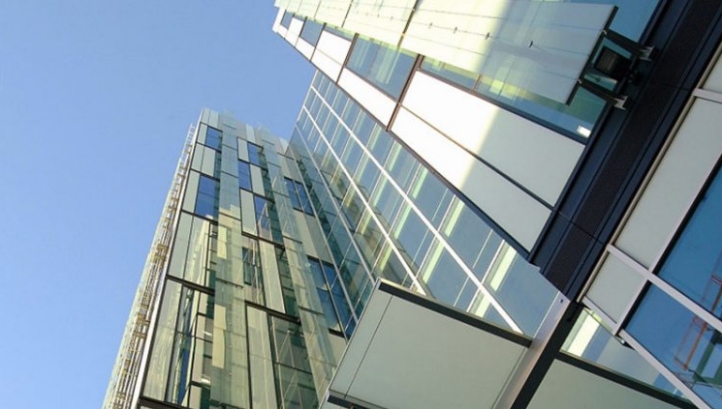Real estate giant JLL’s electricity mix consists of 90% renewables, putting the firm on track to power its direct UK operations solely with renewable sources by 2020.

30% of the buildings JLL manages for clients have now been switched to a 100% renewable electricity contract. Pictured: The 3 Hardman street office complex in Manchester
The progress, posted as part of the firm’s latest annual sustainability report, has assisted in JLL’s shrinking carbon footprint, having reduced the absolute energy consumption of its own UK offices by 30%.
During 2018, renewables accounted for 90% of the company’s electricity mix in this area, with 60% sourced from one 5MW solar farm in Suffolk and the remainder sourced through a mix of onsite arrays and power purchase agreements (PPAs) with other facilities.
According to JLL, the speed of this renewables transition has put it on track to meet its 2020 100% goal. The firm has only been tracking its direct energy mix since 2016, when renewables accounted for 63% of its consumption.
As for the energy consumed by its clients, the report reveals that 30% of the buildings JLL manages for clients have now been switched to a 100% renewable electricity contract. The company claims that this is an unprecedented proportion for the UK real estate sector.
In fact, JLL realised energy savings of £2.8m last year, through investments into renewables, energy efficiency and specialist advice. The savings were recorded across the company’s UK-wide estate of 802 client-managed commercial buildings, which collectively delivered year-on-year energy savings of around 25.8 million kWh.
According to the report, this puts JLL ahead of target to meet its 2020 aim of providing specialist energy and sustainability advice to 90 UK-based clients, and on track to meet a further 2020 goal of delivering five “transformational” green strategies or projects to real estate, infrastructure and city developers.
Large consultancy projects completed during 2018 included the provision of a framework for decarbonising energy infrastructure to the Energy Systems Catapult and the development of a net-positive sustainability strategy for Hammerson and Majid Al Futtaim.
“The built environment [sector] has an enormous impact on the world and we are entering what many are calling the ‘make-or-break’ decade for action,” JLL UK’s chief executive Chris Ireland said.
“Embedding sustainability into our culture – in the way we think and the work we do – is increasingly expected by our stakeholders and supported by the entire JLL UK leadership team.”
Carbon challenges
As well as good progress towards its renewables and energy efficiency goals, the report also notes that JLL’s overall carbon footprint shrank from 8,407 metric tons of CO2e in 2017 to 8,100 metric tonnes last year.
This progress comes as the company is striving to set higher carbon targets, in line with the Paris Agreement, by the end of 2020, after surpassing its 2020 carbon goals three years ahead of schedule. Until it develops a science-based target, JLL UK has pledged to cut building-related emissions by 2% per corporate employee each year and to reduce energy consumption at the same rate.
However, a challenge has proven to be the proportion of JLL UK’s carbon footprint accounted for by transport, which underwent a 4% year-on-year increase during 2018.
In a bid to tackle the issue and put JLL back on track to meeting its 2020 aim of a 10% emissions reduction in this space, against a 2016 baseline, the company’s sustainability team are set to develop the firm’s first electric vehicle (EV) strategy this year and to invest in “smarter” ways of working such as video conferencing systems.
Sarah George
